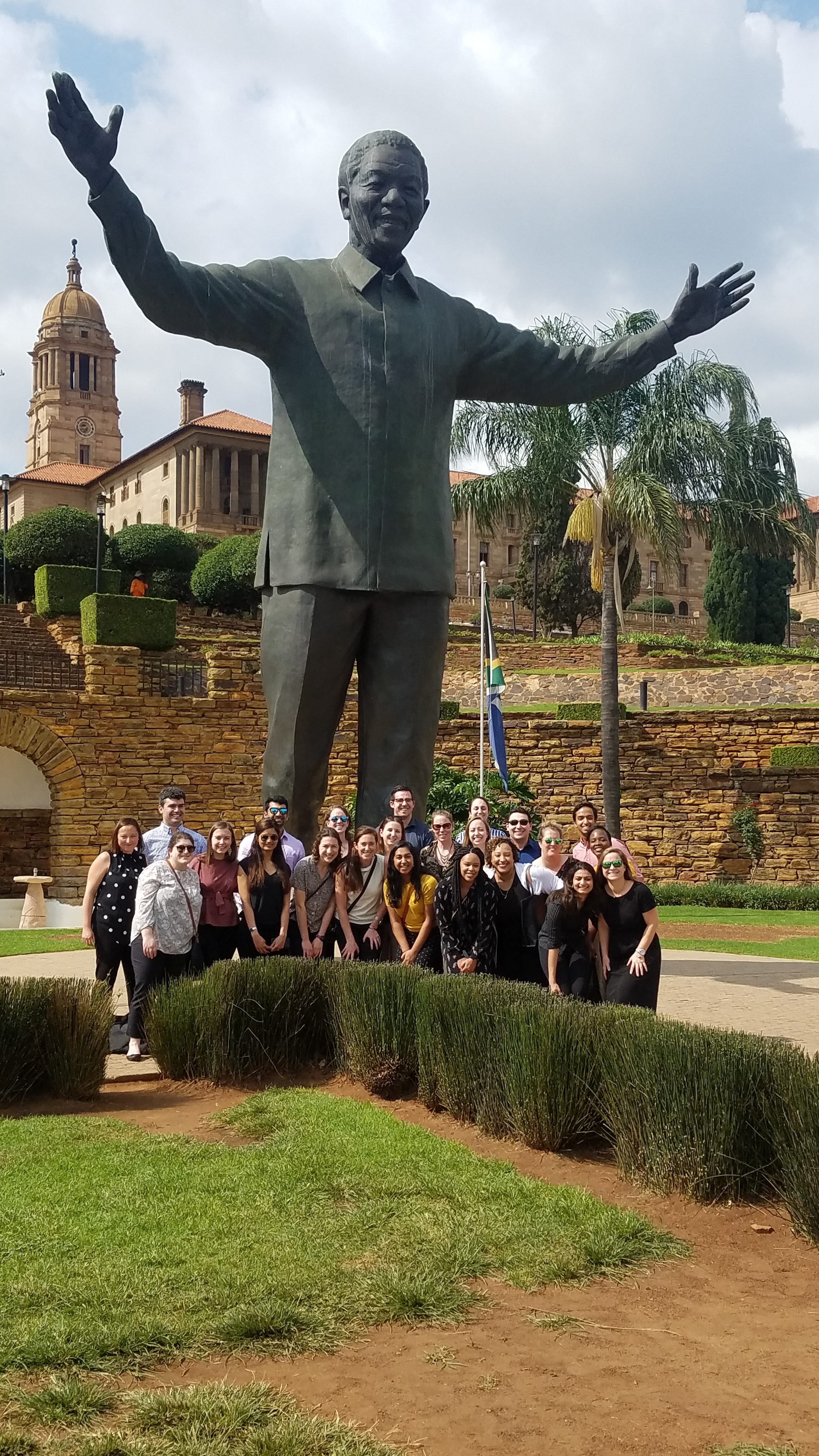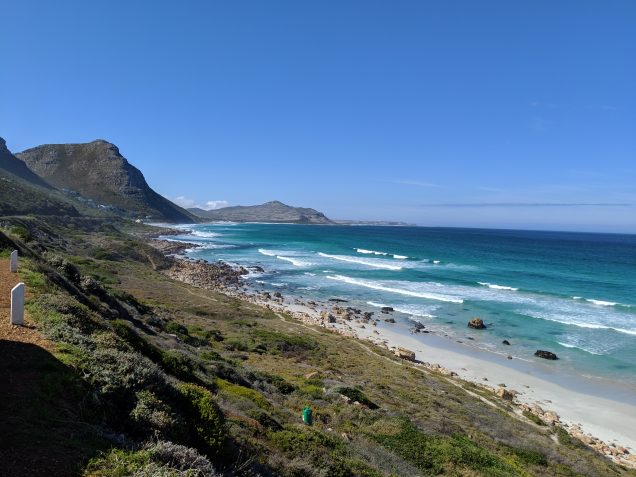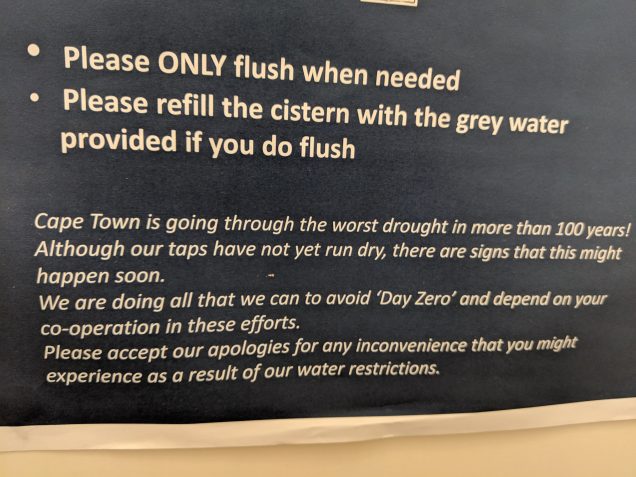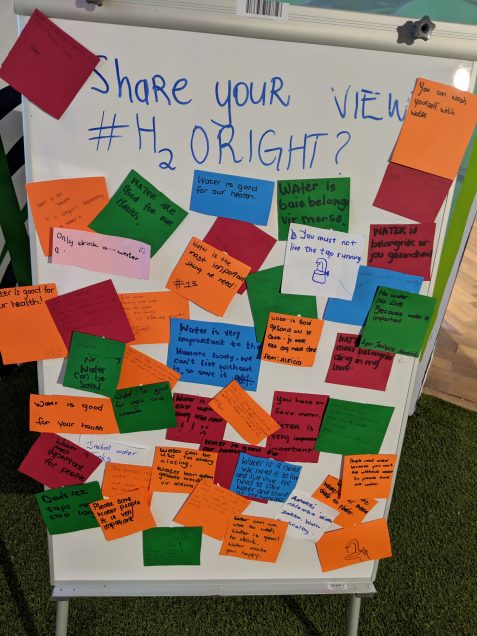South Africa (Spring 2019)
Student participants in the Social Impact Field Seminar 2019 South Africa share their reflections on their learning experience in the below blog posts (unedited)

Solving a crisis: Importance of education, buy-in, and sense of urgency
By Joye
It seemed to me that there were (at least) three keys to solving a crisis of that sort: education, buy-in, and a sense of urgency.
There are so many things I could write about, from the wonderful people we met at all the organizations we visited in Johannesburg, to how much we learned working on the green circular economy problem with NEPAD Business Foundation, to just the experience of traveling together in a group and getting to know our fellow classmates a bit better. I could also write about a host of problems South Africa is facing, from racial inequity to an energy crisis to its vast employment. Instead, I want to write about something that was a bit tangential to the project we worked on: the water crisis in Cape Town.

Photo: South Africa has 1,770 miles of shoreline but is experiencing the worst drought in years.
Cape Town and southern South Africa has been experiencing its worst drought in years and Day Zero was supposed to be the day that Cape Town ran out of drinking water. As such, the country has been taking drastic measures to ensure that the city did not run out of water. Everywhere in Cape Town, I saw signs of water saving measures. In tourist destinations, such as Table Mountain, all sink taps had been turned off and people were told to use the hand sanitizer instead. In one restaurant I went to, the toilet tanks had been disconnected from the bowls and users were told to dump “grey water” from a bucket next to the toilet instead. In restaurants, water did not come with your meal, instead you had to buy still or sparkling water in a bottle. I got used to these measures relatively quickly, and clearly the residents were used to them. What was incredible was how much everyone seemed to understand the water shortage and the importance they put on it.

Photo: Business and tourist attractions often had water taps turned off or signs encouraging ways of saving water
A visit to the South African Museum made me think about how South Africa approached Day Zero a bit more. This museum focuses on science and natural history. It is designed for children, but as someone who works in science education, I like to visit science museums in other destinations. The first exhibit I saw when I walked in was one dedicated to water called Global Water Story, containing all sorts of information about the water cycle and innovative ways to clean water. There was an easel asking children how to save water and it was full of post-it notes of wonderful ideas. There was a sign that said “Effort has resulted in Cape Town being the first city in the world to reduce its water consumption by 50% in just three years.” That vast of a reduction so quickly is absolutely incredible. There are a lot of problems in South Africa, but when I read that number I thought about what a model Cape Town was for the rest of the world in reducing its water consumption.

Photo: The South African Museum had a special exhibit on ways to save water
It seemed to me that there were (at least) three keys to solving a crisis of that sort: education, buy-in, and a sense of urgency. As I saw how Cape Town recovered from its water crisis, I wondered what lessons could be learned from their success. Could this same sense of urgency, buy-in, and education be applied to their energy crisis? Could they be applied to other environmental problems in other countries in order to mitigate them?
While Cape Town is not in peril for the time being, there are effects of the drought that have reached far and wide across the country. https://theconversation.com/how-droughts-will-affect-south-africas-broader-economy-111378 Many jobs were lost in the agriculture industry. The drought also has raised the price of some crops, making it harder for poor people to buy food. The project we worked on for NEPAD Business Foundation proposes job creation through farming and so droughts will play a factor in the success of these endeavors. Large established farms have better technology for irrigation and can buy drought resistant seeds, it is the small-scale farmers who will be most at risk. Hopefully lessons learned from Cape Town will help South Africa prepare for how to deal with future droughts.
Parallels between the lives led by Black South Africans and Black Americans
By Daphnie
This memorialization of what took place in South Africa forces accountability and sets the stage for repairing the wrongs done. In the US, there was no such attempt at reconciliation or restorative justice.
Apartheid cannot be compared to the slavery and Jim Crow laws of the US, but the some of the results are similar. Returning from the trip, I continue to think of the parallels between the lives led by Black South Africans and Black Americans. Both groups with limited options for quality education, reduced access to healthcare, facing discrimination, and denial of oppression. In the case of the US Jim Crow ended in 1965, nearly three decades before apartheid ended in 1994. And yet, the US is not strides ahead on its path to reconciliation. One could argue that the difference may lie in the motivations in ending these policies and laws - the US was under domestic pressure while South Africa's pressure was international. But a possible explanation could be in the actions that were taken once the institutionalized racism ended.
At the end of apartheid, the Truth and Reconciliation Commission held hearings to allow for victims to record crimes committed against them and for perpetrators to confess. In some cases, it allowed for reparations to victims and amnesty under certain conditions to those who had committed crimes. This memorialization of what took place in South Africa forces accountability and sets the stage for repairing the wrongs done. In the US, there was no such attempt at reconciliation or restorative justice. Instead, there are arguments that slavery and Jim Crow were long ago, the people who perpetrated these atrocities are no longer are alive (although white Americans still benefit), and that reparations would be too difficult to determine.
It will be interesting to see how these two countries treat their marginalized populations in the future - will they continue to run parallel to each other? Will one country lap the other?
Tackling social impact issues: the need to coordinate
By Valerie
Since returning, everyone wants to hear about my experiences while in South Africa. When I share my impressions of the major divide that I saw in country, the response from everyone – friends, family, colleagues, and classmates – has been overwhelmingly been the same: “well, is that really any different than what we see in the states?”
My answer to this continues to be a very strong yes. The gap between those with wealth and those who do not have wealth is more severe in South Africa. However, while my answer to this question is yes, I find myself hesitating, because while there might be a difference in magnitude, the sentiment may not be all that different.
Similar to in the US, there is a strong correlation between race and poverty in South Africa. Additionally, both countries have complex histories of racism that have contributed to the challenges in the countries today regarding race and poverty. As a result, I find myself wondering, is the major difference in the magnitude of the divide in the two countries largely attributed to the fact that apartheid occurred so much more recently than the US’s history with slavery?
When I think this way, it can be very discouraging, because if this is the case, then South Africa is looking down a very tough road, of hundreds of years of unwinding from the challenges created by such a tragic history. As I reflect on this question, I am trying to remain hopeful. Despite the fact that there is strong evidence that there are still major issues of racism in South Africa, I am hopeful that South Africa can recover from the challenges created by colonialism and apartheid more quickly than the US has recovered from its challenges and perhaps, South Africa can learn from the mistakes that have been made in the US.
Reflecting on the business visits that we went on brings me hope, as in just a short five days, we were able to see such strong examples of both the private and public sector working to directly address some of the issues of inclusion and access to education, electricity, and healthcare. However, I continue to be struck by how many issues the country is working to address, the magnitude of these issues, and how diverse the issues are. While issues of education, health, electricity, and inclusion are all connected, each issue is individually quite complicated. The fact that these issues are all manifesting in communities concurrently also creates a whole additional layer of complexity. ‘
This challenge is also something that the US faces. Issues of socioeconomic status, healthcare, and housing stability regularly come up when discussing how to reduce the achievement gap that exists in education between urban people of color and white suburban students. However, when policy makers work to address these issues, they are often work in silos, which results in only slowly chipping away at the root causes and challenges that people in poor communities are facing.
Given that the social impact issues in South Africa are also multifaceted, span multiple industries, but are fundamentally intertwined by nature, I am left wondering whether there is a way for the country to more effectively coordinate the efforts. For example, is there a way for businesses in the power industry to directly collaborate with educators, and health care providers to create solutions that support improving a community’s trajectory holistically? And if so, would this more quickly and directly address the fundamentally divide that exists in the country?
Taking an active role in improving lives
By Iswarya
I am looking forward to taking part in more opportunities that stimulate conversations about the global economy and how we can actively have a role in making the world a more equitable place.
Adjusting to life back in Boston was definitely a whirlwind. But settling back into classes has let me really appreciate the experiences that we had in South Africa. It was really exciting to have the opportunity to see the business principles that we had learned so much about in a setting where we could see the real-world applications and effects. The opportunity to go to a different country and explore the ways that companies are aiming to improve the lives of people in the community was truly inspiring.
Going to South Africa provided me with a new outlook on how emerging countries that have prominent business structures can still real economic and social struggles. Learning about the 30% unemployment rate was really shocking, because the area in which we were staying showed no proof of that statistic. The effects of the unemployment rate could be seen much more evidently in the proper city center of Johannesburg and in Hillsborough, where the younger population were forced to sell items on the sides of roads so as to actually make money to survive. Seeing this really made me think about how communities are still impacted by segregation, even with the multitude of initiatives in place that are meant to alleviate the disparity caused by Apartheid. Visiting the Apartheid museum was one of the most valuable experiences that we had in Johannesburg because as an outsider I did not fully understand the horrible acts and crimes that were committed in order to keep the people of South Africa segregated. Visiting this museum led me to think about how when it comes to race and racial tension, history seems to repeat itself time and time again.
The company visits helped to highlight important issues that need to be tackled to allow for more equitable circumstances for all people and communities in South Africa. Our conversation about the lack of access to electricity at Eaton Electric was really interesting because access to electricity has always been considered a basic utility that is always available. Creating access to these crucial utilities is important in creating equality among all the populations and communities in South Africa.
This field seminar really helped provide me with insights and experiences that have helped to round out my experiences thus far at Questrom. I am looking forward to taking part in more opportunities that stimulate conversations about the global economy and how we can actively have a role in making the world a more equitable place.
Influence on my future career path
By Julie
One thing that was made certain through this experience is that I want to be involved in meaningful work that will help make a lasting impact in the world.
As I reflect on my time spent in South Africa, I am very grateful to have gotten the opportunity to explore a new culture and broaden my outlook on the world. It was a rewarding experience to hear about the various challenges facing South Africans directly from professionals working to improve outcomes on a social, economic, and environmental level. Our discussions at the World Health Organization helped provide a broad perspective on how the different focus areas of our program, including access to education, sustainable energy, financial wellbeing, and social inclusion are all interconnected and are determinants of health. Understanding how these areas are linked provided a better context for just how complex and difficult solving these problem can be. Despite the country’s growth and innovation in areas such as health care and technology, the wide gap in socioeconomic classes and the high unemployment rate are realities that can’t be ignored. Basic amenities like access to electricity that I take for granted are difficult to obtain for many due to poor infrastructure and government corruption.
Companies like Secha Capital that are investing in black-owned businesses and creating jobs and Eaton Electric that are working to create sustainable energy opportunities are paving the way for other organizations to follow their lead. I was particularly impressed with the interesting work being done by Mandate Molefi to break down the social and cultural barriers that may be hindering an inclusive workplace by first changing a leader’s mindset. While it is impossible to identify a single solution that will reduce the inequalities and income disparities the country faces as a whole, I am a firm believer in the power of education. As noted in Room to Read’s annual report, “Education is the ultimate game changer.” Receiving a quality education opens doors for students and their families to improve their quality of life and economic situations. It also offers the prospect of hope that by educating and empowering today’s children, they become the next generation of change makers that can tackle societal issues affecting those around them.
As I am nearing the end of my MBA program, I am considering my next steps in my professional life. One thing that was made certain through this experience is that I want to be involved in meaningful work that will help make a lasting impact in the world. While I am still deciding how I can best contribute to society, I am confident that the knowledge and insights I have gained during this trip will greatly influence how I choose to spend my time and my future career path.